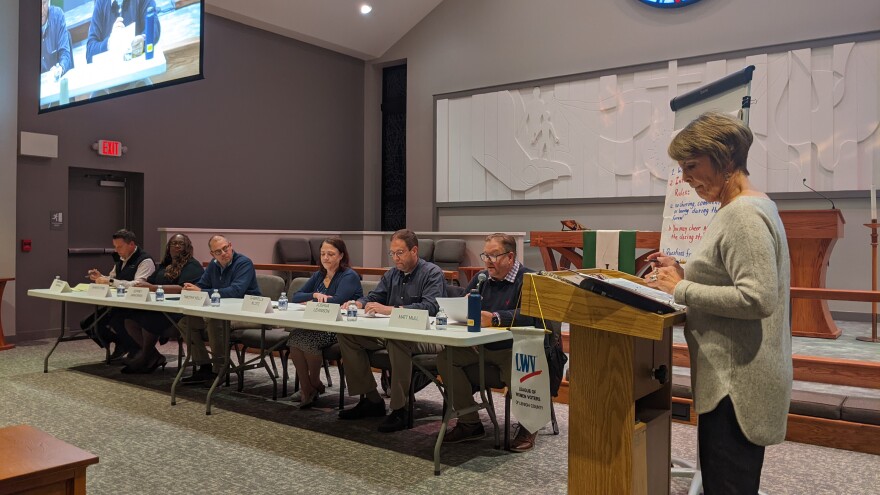- School board races across the Lehigh Valley are seeing historic levels of spending ahead of Election Day
- Candidates in Bethlehem, East Penn, Parkland and Southern Lehigh have raised more than $20,000 over the last four months
- Historically, school board candidates often sign waivers vowing they won't spend more than $250 in their campaigns
ALLENTOWN, Pa. — Local school board candidates continued to pump unprecedented levels of money into their campaigns over the last few months, with Republicans in several districts raising nearly $20,000 or more.
Historically, local school board races were sleepy affairs where candidates rarely spent more than $250 while seeking the unpaid office. That continues to be the case even in some heated races. For instance, the Nazareth Area School Board race has centered on book bannings and the rights of transgender students, culture war fights that have fomented national debate. Yet all of the candidates in Nazareth signed waivers pledging they would not sink sizeable sums into their campaigns.
Political action committees supporting candidates in East Penn, Parkland and Southern Lehigh have repeatedly broken the bank this year, campaign finance reports filed with Lehigh and Northampton counties and the state show. In the Bethlehem Area School District, one candidate has outspent the field by a rate of nearly 39-to-1.
Christopher Borick, professor of political science at Muhlenberg College, said the unrivaled levels of spending have erupted in school board races across the state and country. In the race for Central Bucks School District, candidates are spending money once reserved for congressional campaigns, Borick said.
"When I saw the numbers, I couldn't believe they were real," he said.
The spending, he said, is a sign of hownational politics has been absorbed into local races. As local candidates have taken on bigger topics such as critical race theory, they've been able to tap into donors with deep pockets who share similar causes. Most often, Borick said, it's occurring in wealthy suburban districts, but he said it can comes down to which individual candidates are able to make connections with rich donors.

East Penn School District
On its face, the East Penn race has focused on taxes, school safety and academics. But the nature of the campaign itself has become part of the dialogue, too. Some of the main supporters for the Republican slate of candidates, Your Voice on the Board, have ties to Moms for Liberty and have promoted other conservative wedge issues. The GOP slate has asserted its independence from these outside organizations while the Democratic slate Defend East Penn has sounded alarm bells.
Over the past four months, the Your Voice on the Board PAC raised $21,950. Most of the money came from deep-pocketed donors, including candidates Paul Barbehenn ($5,000) and Matt Mull ($1,500); David Jaindl ($2,000) and Catherine Jaindl-Leuthe ($1,000) of Jaindl Farms; Anthony Salvagio, president of the technology firm CAI ($2,000); and auto dealer Andrew Wright ($2,000).
By comparison, the Democratic slate and its Valley Values PAC had only two donors that contributed $1,000 or more this period — state Rep. Peter Schweyer, D-Lehigh; and We Invest in Lives and Dreams, a Washington D.C. PAC associated with U.S. Rep. Susan Wild, D-Lehigh Valley. However, the PAC received more money from donors who contributed $250 or less. Overall, the Valley Values PAC reported raising $8,238 this period.
Unlike the Republicans, the Democratic slate had significantly more money in the bank entering the period. The Valley Values PAC saw $17,566 moving through their accounts during this period, as compared to the $22,386 for the Your Voice on the Board PAC. After expenses, the Valley Values PAC had $9,389 on hand compared to the $6,519 for Your Voice on the Board PAC — potentially enough for one more mailer from each side before the election.
Parkland School District
Similar wedge issues have cropped up in the Parkland School Board race. While most of the public discussion has centered on taxes and government transparency, matters such as critical race theory have cropped up at times.
Common Sense Solutions, a state political action committee associated with former Lehigh County Commissioner Dean Browning, has been backing the Republican slate. It reported raising $27,450 for the group and spending almost all of it this period. Nearly all of the money came from large donations, including $5,000 from Back to School PAC, a controversial group funded by Bucks County venture capitalist Paul Martino. Other large donations include $5,000 from William Bachenberg, who attempted to overturn Pennsylvania's 2020 election results; $2,000 from Salvagio and $2,000 each from Wright and his wife Catherine.
The Democratic slate, Proud of Parkland, raised just a fraction of that amount over the past four months. Its Concerned Parents for Parkland PAC reported just $4,374 in donations and had only $937 in the bank, according to its filing. About half of the new funding came from Democratic politicians and associated PACs. Those include Schweyer; the We Invest in Lives and Dreams PAC; state Rep. Mike Schlossberg, D-Lehigh; and state Sen. Nick Miller, D-Lehigh. Each donated $500.

Southern Lehigh School District
Political lines have blurred in the Southern Lehigh School Board race, where most of the candidates are registered Republicans. However, the candidates appearing as Republicans on the ballot have labeled themselves "True Republicans" and are running on a pledge to not raise taxes for two years and are promoting a neutrality policy. Under the policy, parents would be notified if a child requests using different pronouns at school, and district employees would be barred from promoting any political cause. During a debate, members of the Republican slate said wearing a pride flag pin would be barred under the policy while wearing an American flag pin would pass muster.
The Republican slate and its political action committee, Southern Lehigh Grassroots PAC, appear to be gaining steam ahead of the November election. Over the last reporting period, the PAC raised raised $20,273 and still has $16,153 on hand heading into the final stretch. While it reported significant contributions from the Lehigh County Republican Committee ($2,000), Lehigh County Republican Committee Chair Joe Vichot ($1,103) and attorney William Sheinler ($5,082), it reported donations of different shapes and sizes. Donors who gave less than $50 each contributed a total of $3,826, according to the PAC's latest filing.
The Democratic candidates and their political action committee, Southern Lehigh Community Partners, raised a little more than half that amount. It reported donations totaling $11,847, almost all of which were from a few large donors. The biggest backers were physician Beth Stepanzuk, who contributed $5,000, and Frank Lawler, the COO of a wealth management firm who donated $2,500.
Bethlehem Area School District
The Bethlehem Area School District is heavily Democratic and hasn't drawn the same level of political contributions as the other races. However, Republican Cindy O'Brien has spent nearly $30,000 in her bids for two seats on the board. If she wins both, she would pick which seat she would fill and the new board would appoint someone to the vacancy.
O'Brien, who has been endorsed by Moms For Liberty, has run on a platform of transparency and safety. In her latest campaign finance filing, she reported raising $19,762. While her report did not disclose the origin of that money, O'Brien said in a phone interview Tuesday evening that she spent her own money on mailers, consultants and ads.
By contrast, most of her opponents signed waivers saying they would not raise any money. Only Kim Shivley, a Democrat running for an at-large seat, reported any significant spending. She donated her campaign over $767 to pay for yard signs and campaign signs, according to her filing.
The Value of Money
Building a bigger war chest allows candidates to host more events, advertise their message, raise awareness about pet issues and plaster their name across banners and yard signs, but it doesn't guarantee victory. Both the Lehigh Valley and national politics are littered with cases where the richer candidate never took the oath of office in January.
But more often than not, Borick said, the candidates who raise the most money win on Election Day. More funding provides candidates more tools to connect with voters. However, it's not clear if having more money makes candidates successful or if successful candidates are able to raise money, Borick said. Other factors such as incumbency, name recognition and building a well-organized campaign make it easier to fundraise, but those also make it easier to consistently turn out votes.
In some races, candidates likely need to significantly outspend their candidates if they have any hope of winning, Borick said. He pointed to O'Brien as an example. The Bethlehem Area School District is heavily Democratic; neither Borick nor other other political observers could recall the last time a registered Republican won a seat on the board. For a candidate to break through, they likely would need to pump thousands of dollars into the race.
"Post-race, people are going to be trying to draw lots of conclusions. Did all these resources pay off for all these races?" he said.


